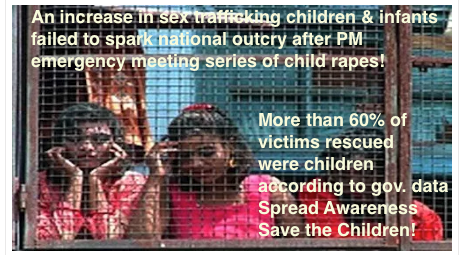Rape and murder of a 6 year old by man in India. Authorities have consistently failed to use the law to protect children from pedogate!

In Bengaluru, India, "according to News 18, A 35-year-old man has been sentenced to death by a city court for the rape and murder of a six-year-old girl in Bengaluru last year.
54th City Civil and Sessions Judge M Lathakumrai held Anil Balagar guilty of rape and murder and sentenced him to 10 years of rigorous imprisonment and death respectively for the crimes.
According to the prosecution, Balagar had raped and killed the girl on April 21 last year and kept her body hidden in his house.
The girl was reported missing since April 20 and on the basis of a complaint from her grandfather, the local police had registered a case.
The girl had come to her grandfather's house. Balagar, a neighbour of the victim's grandfather, lured the girl and took her to his house, where he raped and killed her, the prosecution had said.
A few days after the girl went missing, a foul smell had started emanating from Balagar' locked house. The neighbours had broken open the door and found the highly decomposed body of the girl under a cot, the police said.
A case was registered under the POCSO Act and Anil was arrested, they added."
Source link https://www.news18.com/news/india/death-penalty-for-man-for-6-year-old-girls-rape-murder-1733287.html
According to reuters, "MUMBAI (Thomson Reuters Foundation) - People selling children into India’s sex trade are unlikely to be deterred by a new order approving the death penalty for child rape, because laws are rarely applied in trafficking cases, said a leading campaigner.
India’s Protection of Children from Sexual Offences (POCSO) Act - which allows lifetime prison sentences for people who sexually assault children - is being amended to introduce the death penalty for the rape of children below age 12.
But authorities have consistently failed to use the law to prosecute child sex trafficking, said Sunitha Krishnan, who was named today as a finalist for the prestigious Aurora Humanitarian Prize.
“The death penalty can be a deterrent only if POCSO is applied in trafficking cases, and if there is speedy trial and justice,” said Krishnan. “But POCSO is applied in very few trafficking cases.”
India’s cabinet approved the amendment on April 21 after Prime Minister Narendra Modi held an emergency meeting in response to nationwide outrage in the wake of a series of child rape cases.
However, an increase in the sex trafficking of children and infants has failed to spark a similar national outcry, according to campaigners.
Reports of human trafficking rose by almost 20 percent in 2016 against the previous year to more than 8,000. More than 60 percent of nearly 24,000 victims rescued were children, according to government data.
Krishnan, a gang rape survivor whose Hyderabad-based charity has rescued and rehabilitated scores of trafficking victims over the last two decades, said authorities are becoming more aware of the crime - but that has not translated into action.
“There is a big gap between the rate with which this problem is expanding and our response to it,” she told the Thomson Reuters Foundation.
While authorities do use existing laws to prosecute pimps, brothel managers and traffickers, customers who assault children trafficked into sexual slavery are rarely arrested, Krishnan said.
“By the time we get our act together and do something, so many lives will be sacrificed,” said Krishnan, who is also a recipient of one of India’s highest civilian awards, the Padma Shri.
The annual Aurora Prize for Awakening Humanity was founded by Armenia-based 100 LIVES, a global initiative that commemorates a 1915 massacre in which up to 1.5 million Christian Armenians were killed by Ottoman Muslims."
According to Redress Online, "To be born poor in our world is to be born vulnerable and in danger of exploitation. To be born female and poor is to greatly intensify the risks.
If you are born a girl to parents of tea-pickers in Assam in northeastern India (earning as little as 1.50 US dollars a day) there is a good chance you will be sold to a local “recruitment agent” by your loved ones for around 50 dollars, and the agent will sell you on to a city “employer” for up to 800 dollars and into a life of abuse and suffering.
When Elaina Kujar was 14, she was trafficked to Delhi from the Lakhimpur district of Assam and spent four years as a sex slave. The Guardian newspaper reports that her owner “would sit next to her watching porn in the living room of his Delhi house, while she waited to sleep on the floor. “Then he raped me,” she says, looking down at her hands, then out of the door.” It is thought there are hundreds of thousands of girls, some as young as 12 years old, being sold into slavery of this kind in the capital. It is a brutal picture repeated more or less throughout India, where there are early signs that the “economic miracle”, which has fuelled widespread inequality, is beginning to unravel."
What are your thoughts on this? Please let me know in the comments below. Godspeed!